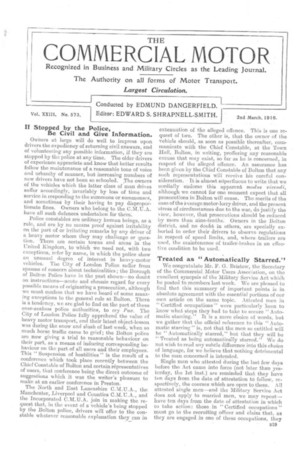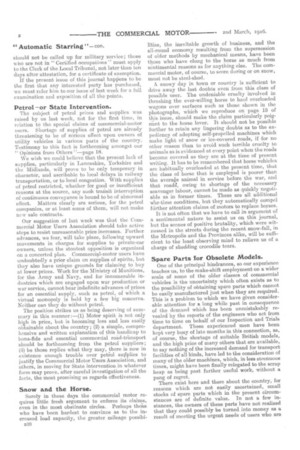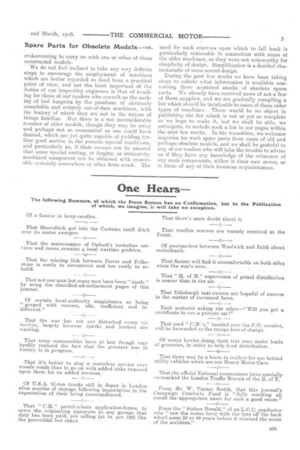If Stopped by the Police, Be Civil and Give Information.
Page 1

Page 2

Page 3

If you've noticed an error in this article please click here to report it so we can fix it.
Owners at large will do well to impress upon drivers the expediency of returning civil answers, and of volunteering any possible information, if they are stopped by the police at any time. The older drivers of experience appreciate and know that better results follow the maintenance of a reasonable tone of voice and urbanity of manner, but increasing numbers of new drivers have not been so schooled. The owners of the vehicles which the latter class of man drives suffer accordingly, invariably by loss of time and service in responding to the summons or surnmonseS, and sometimes by their having to pay disproportionate fines. Owners who belong to the C.M.U.A. have all such defences undertaken for them.
Police constables are ordinary human beings, as a rule, and are by no means proof against irritability on the part of or irritating remarks by any driver of a heavy motor whom they may challenge or question. There are certain towns and areas in the United Kingdom, to which We need not, with two exceptions, refer By name, in which the police show an unusual degree of interest in heavy-motor vehicles. The City of London Police suffer from spasms of concern about technicalities ; the Borough of Bolton Police have in the past shown—no doubt on instructions—acute and chronic regard for every possible means of originating a prosecution, although we must confess that we have heard of some amazing exceptions to the general rule at Bolton. There is a tendency, we are glad to find on the part of these over-zealous police authorities, to cry Fax. The City of London Police fully apprehend the value of heavy motor transport, and their latest object-lesson was during the snow and slush of last week, when so much horse traffic came to grief; the Bolton police are now giving a trial to reasonable behaviour on their part, as a means of inducing corresponding behaviour on the part of all users and their employees. This " Suspension of hostilities " is the result of a conference which took place recently between the Chief Constable of Bolton and certain representatives of users, that conference being the direct outcome of suggestions which it was the writer's pleasure to make at an earlier conference in Preston.
The North and East Lancashire C.M.U.A., the Manchester, Liverpool and Counties C.M.U.A., and the Incorporated C.M.U.A. join in making the request that, in the event of a vehicle's being stopped by the Bolton police, drivers will offer to the constable whatever reasonable explanation they ean in extenuation of the alleged offence. This is one request of two. The other is, that the owner of the vehicle should, as soon as possible thereafter, communicate with the Chief Constable, at the Town • Bolton, in writing, proffering any reasonable excuse that may exist, so far as he is concerned, in respect of the alleged offence. An assurance has been given by the Chief Constable of Bolton that any such representations will receive his careful consideration. It is almost sijperfluous to write that we cordially endorse this apparent modus although we cannot for one moment expect that all prosecutions in Bolton. will cease. The merits of the case of the'average meter-lorry driver, and the present stress of circiirristancee due to the war, do justify the view, however, that prosecutions should be reduced by more thaii nine-tenths: Owners in the Bolton district, and no doubt in others, are specially exhorted to order their drivers to observe regulations in respect of speed limits, and, where trailers are used, the maintenance of trailer-brakes in an effective condition to be used.
Treated as "Automatically Starred."
We congratulate Mr. F. (I. 'Bristow, the 'Secretary of the Commercial Motor Users Association, on the excellent synopsis of the Military SerVice Act whidli he posted to members last week. • We are pleased to find that this summary of important points is in absolute agreement with the essential portions of our own article on the same topic. Attested men in " Certified occupations'' were particularly keen to know what steps they had to take to secure " Automatic starring." It is a mere choice of words, but we gather that the official reference to this " Automatic starring " is, not that the men so entitled will be " Automatically starred," but that they will be " Treated as being automatically starred." We do not wish to read any subtle difference into this choice of language, for we believe that nothing detrimental to the men concerned is intended.
Single men who attested during the last few days before the Act came into force (not later than yesterday, the 1st inst.) are reminded that they have ten days from the date of attestation t6 follow,respectively, the courses Which are open to them. All attested single men—and the Military Service Act does not apply to married men, we may repeat— have ten days from the date of attestation in which to take action: those in " Certified occupations" must go to the recruiting officer and claim that, as they are engaged in one of these occupations, they should not be called up for military service; those who are not in "Certified occupations" must apply to the Clerk of the Local Tribunal, not later than ten days after attestation, for a certificate of exemption.
If the present issue of this journal happens to be the first that any interested party has purchased, we must refer him to our issue of last week for a full examination and exposition of all the points.
Petrol-or State Intervention.
The subject of petrol prices and supplies was raised by us last week, not for the first time, in relation to the special claims of commercial-motor users. Shortage of supplies of petrol are already threatening to be of serious effect upon owners of utility vehicles in various parts of the country. Testimony to this fact is forthcoming amongst our 'Opinions from Others "—page 18.
We wish we could believe that the present lack of supplies, particularly in Lancashire, Yorkshire and the Midlands, will prove to be only temporary in character, and ascribable to local delays in railway transportation, or to local congestion. With supplies of petrol restricted, whether for good or insufficient reasons at the source, any such transit interruption of continuous conveyance is bound to be of abnormal effect. Matters clearly are serious, for the petrol companies, or at least some of them, will not make new sale contracts.
Our suggestion of last week was that the Commercial Motor Users Association should take active steps to resist unreasonable price increases. Further advances, we fear, will take place, following upward movements in charges for supplies to private-car owners, unless the stoutest opposition is organized on a concerted plan. Commercial-motor users have undoubtedly a prior claim on supplies of spirits, but they also have unique grounds for claiming to buy at lower prices. Work for the Ministry of Munitions, for the Army and Navy, and for innumerable industries which are engaged upon war production or war service, cannot bear indefinite advances of prices for an essential supply, such as petrol, of which a virtual monopoly is held by a few big concerns. Neither can they do without petrol.
The position strikes us as being deserving of summary in this manner:—(1) Motor spirit is not only high in price, but is becoming less and less easily obtainable about the country ; (2) a simple, comprehensive and written explanation of this handicap to bona-fide and essential commercial road-transport should be forthcoming from the petrol suppliers ; (3) be those replies what they may, there is now in existence enough trouble over petiol supplies to justify the Commercial Motor Users Association, and others, in moving for State intervention in whatever form may prove, after careful investigation of all the facts, the most promising as regards effectiveness.
Snow and the Horse.
Surely in these days the commercial motor requires little fresh argument to enforce its claims, even in the most obstinate circles. Perhaps those who have been hardest to convince as to the increased load capacity, the greater mileage possibi n20 lities, the inevitable growth of business, and the all-round economy resulting from the supersession of older methods by mechanical means, have been those who have clung to the horse as much from sentimental reasons as for anything else. The commercial motor, of course, to score during or on snow, must not be steel-shod.
A snowy day in town or country is sufficient to drive away the last doubts even from this class of possible user. The undeniable cruelty involved in thrashing the ever-willing horse to haul overloaded wagons over surfaces such as those shown in the photographs, which we reproduce on page 13 of this issue, should make the claim particularly poignant to the horse lover. It should not be possible further to retain any lingering doubts as to the expediency of adopting self-propelled machines which make light of snow or ice-covered roads, if for no other reason than to avoid such terrible cruelty to animals as is evidenced at every point when the roads become covered as they are at the time of present writing. It has to be remembered that horse vehicles are habitually overloaded at the present time, that the class of horse that is employed is poorer than the average animal in service before the war, and that road, owing to shortage of the necessary scavenger labour, cannot be made as quickly negotiable as in former times. These are all additional war-time conditions, but they automatically compel further attention claims of motors to replace horses.
It is not often that we have to call in argument of a sentimental nature to assist us on this journal, but the scenes of positive brutality, which were witnessed in the streets during the recent snow-fall, in the Metropolis and the Provinces alike, will be sufficient to the least observing mind to relieve us of a charge of shedding crocodile tears.
Spare Parts for Obsolete Models.
One of the principal hindrances, so our experience teaches us, to the make-shift employment on a wider scale of some of the older classes of commercial vehicles is the uncertainty which often exists as to the possibility of obtaining spare parts which cannot be easily manufactured just when they are required. This is a problem to which we have given considerable attention for a long while past in consequence of the demand which has been unmistakably revealed by the reports of the engineers who act from time to time on behalf of our Inspection and Trials department. These experienced men have been kept very busy of late months in this connection, as, of course, the shortage of suitable British models, and the high price of many others that are available, to say nothing of the increased demand for transport facilities of all kinds, have led to the consideration of many of the older machines, which, in less strenuous times, might have been finally relegated to the scrap heap as being past further useful work, without a pang of regret. There exist here and there about the country, for reasons which are not easily ascertained, small stocks of spare parts which in the present circumstances are of definite value. In not a few instances, the owners of these parts have not realized that they could possibly be turned into money as a result of meeting the urgent needs of users who are endeavouring to carry on with one or other of these resurrected models.
We do not feel inclined to take any very definite steps to encourage the employment of machines which are better regarded as dead from a practical point of view, and not the least important of the duties of our inspecting engineers is that of avoiding for those of our readers who consult us the making of bad bargains by the purchase of obviously unsuitable and entirely out-of-date machines, with the history of which they are not in the nature of things familiar. But there is a not inconsiderable number of older models, though they may be noisy and perhaps not so economical as one could have desired, which are yet quite capable of yielding further good service in the present special conditions, and particularly so, if their owners can be assured that some special casting, or forging, or intricatelymachined component can be obtained with reasonable certainty somewhere or other from stock. The need for such reserves upon which to fall back is particularly noticeable in connection with some of the older machines, as they were not noteworthy for simplicity of design. Simplification is a decided characteristic of more recent design: During the past few weeks we have been taking steps to collate what information is available concerning there scattered stocks of obsolete spare parts. We already have received news of not a few of these supplies, and we are gradually compiling a list which Should be invaluable to users of these older types of machines. There would be no object in publishing the list which is not as yet so complete as we hope to make it, but we shall be able, we anticipate, to include such a list in our pages within the next few weeks. In the meantime, we welcome inquiries for such spare parts from users of old and perhaps obsolete models, and we shall be grateful to any of our readers who will take the trouble to advise us if they have any knowledge of the existence of any such components, either in their own stores, or in those of any of their business acquaintances.




















